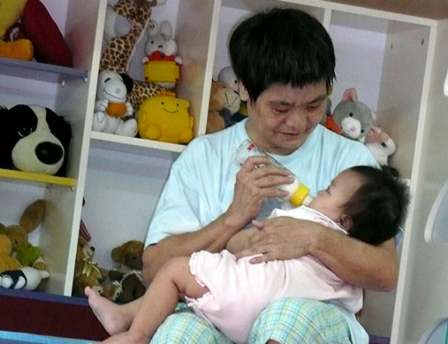Fighting Eviction, Taiwan AIDS Shelter Helps Transform Human Rights Law
A little more than a year ago, Harmony Home, an organization in Taiwan that provides housing and care for HIV-positive people and their children, was facing eviction from its Taipei quarters because of opposition from neighbors who did not want people living with HIV in their community. Now, thanks to the efforts of AIDS advocates in Taiwan and around the world, Harmony Home has secured the right to stay—in the process spurring the passage of important new human rights laws extending full protection to people living with HIV/AIDS in Taiwan.
"Under the law, no hospice, nursing home, halfway house or rehabilitation center can deny the admission of people living with HIV/AIDS," said Dr. Yi-Ming Arthur Chen of the Institute of Public Health and AIDS Prevention and Research Center at National Yang-Ming University in Taipei. "This is a victory for HIV/AIDS patients in Taiwan." Dr. Chen, a member of TREAT Asia's steering committee and a prominent AIDS advocate, played a key role in garnering support for Harmony Home and helping to draft the legislation.
Nicole Yang, who founded Harmony Home in 2003, cited the legal maneuvering that surrounded the initial eviction effort for changing the public's perception of HIV/AIDS. "Because of the publicity raised by the court case, people were forced to see the reality of AIDS in Taiwan. Many people started responding to us: giving us support during the court case, inviting us to give talks in their communities or schools, volunteering their time in our shelters."

At Harmony Home, adult residents help care for the children in the shelter.
When Harmony Home first moved into its present location in Taipei's Wenshan district in 2005, neighbors were openly hostile. According to Yang, they felt threatened by the presence of HIV-positive residents and attempted to force them out. "During the first months, they harassed the residents in the shelter by blocking us from coming into the house and threatening us with lawsuits if we didn't relocate immediately," Yang remembered. The management of the housing complex where Harmony Home was located attempted to evict its residents and eventually filed a lawsuit to force their relocation. In October 2006, the Taipei District Court ruled in favor of the management committee and ordered Harmony Home to move.
The court's decision sparked an outcry among AIDS advocates in Taiwan and across Asia. Several regional and international organizations, including TREAT Asia, responded to Yang's call for help. In addition to writing letters of support, TREAT Asia and amfAR assisted the facility by researching similar cases in the U.S. that provided a precedent for legally guaranteeing housing rights for people with HIV/AIDS.
Securing the Rights of the HIV-Positive
After Harmony Home lost its first case in 2006, public hearings were organized by legislators and AIDS advocates to discuss the implications of the case and related issues such as the status of civil rights for people with HIV/AIDS. The meetings led to a recommendation that Taiwan's laws be changed to extend human rights protections to people with HIV/AIDS, including the right to live in any community and to be accepted by all care facilities. Participants also called for legislation to provide legal protection to healthcare providers working in harm reduction programs, including syringe exchange, which is illegal in Taiwan.
The Human Immunodeficiency Virus Prevention and Patients' Rights Protection Act was passed in July 2007, securing the rights of HIV-positive people to housing, care, and equal protection under the law. As a member of advisory committees in the ministries of health and education, Dr. Chen was involved in drafting and reviewing the legislation, as well as lobbying for its passage. A month after the bill was passed, Taiwan's High Court followed the legislature's lead. Reversing the earlier decision by the Taipei District Court, the High Court ruled that the housing complex where Harmony Home is located could not force the care facility to leave.
New Law "Just a Beginning"
Yang sees a bright future for Harmony Home and for others living with HIV/AIDS in Taiwan. The attention the organization has received as a result of its legal struggle has, paradoxically, allowed its residents to live more openly and to take on new roles as AIDS educators in schools and universities across Taiwan.
Harmony Home's education campaigns are "a good experience both for people with HIV and the audience," she said. "At the end of our talks, there is always a change in attitude among the students—after being informed of how HIV is transmitted, they are not afraid to give hugs to people with HIV/AIDS, shaking their hands and giving them smiles and words of support."
Yang noted that there have been no protests in the local community since the court ruling. Calling the new law "just the beginning," she stressed the importance of reaching out to undocumented people living with HIV/AIDS who are afraid to be tested, and continuing to fight stigma and discrimination.
Dr. Chen concurred. Perhaps, he suggested, the Harmony Home case may set a regional precedent and prompt other Asian countries to examine their HIV/AIDS policies. "During the last meeting of TREAT Asia in Hanoi," he said, "several participants came up to me and said they were very interested in the case. If we could do it in Taiwan, they think, they can advocate for it in their countries.""I am hopeful that in working together with our partners who are also committed to fighting HIV/AIDS, we may be able to effect more change in the attitudes of people toward HIV/AIDS," she said. "We feel that we are not alone in our cause—we are grateful for the support given by our friends from AIDS organizations, private companies, religious groups, and the Taiwanese government. It is in working together that we can effectively fight HIV/AIDS."